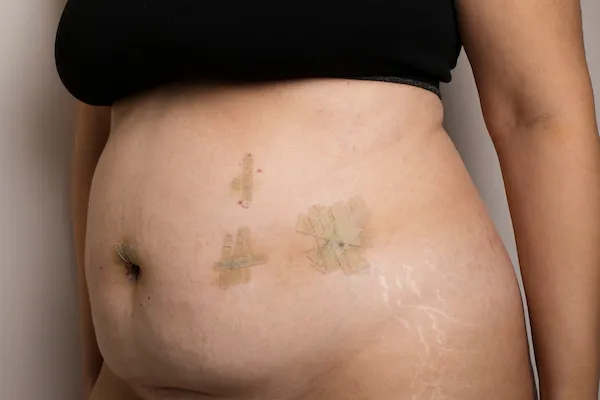Gastric Sleeve Surgery In Turkey
The number of obese people is increasing worldwide due to the influence of bad high-fat, high-calorie eating habits. If obesity does not improve with exercise, diet, and existing treatments, will you have to live overweight for the rest of your life?
Recently obesity surgery in Turkey has been attracting attention as one of the methods to treat obesity and it is one of the surgeries that is becoming more common and popular.
So, if you undergo gastric sleeve surgery in Turkey, will the treatment be completed, and can you be free from obesity? In bariatric surgery, continuous management, including complications and lifestyle modifications, is important even after treatment, so careful decisions must be made before surgery.
The best Gastric sleeve surgery in Istanbul is performed perfectly at Lerra Clinic to improve the patient’s quality of life and help them regain a positive sense of themselves.
Table of Contents
What Is Gastric Sleeve Surgery?
Gastric sleeve surgery, also known as sleeve gastrectomy, is a type of weight loss surgery that involves removing a large portion of the stomach to create a “sleeve” for the stomach. smaller, shaped like a banana. This surgery helps people lose weight by reducing the amount of food they can eat at one time, as well as limiting the amount of calories and nutrients the body can absorb. It is typically used as the first step in a two-stage weight loss surgery for people with morbid obesity and can be an effective way to help people achieve significant and sustained weight loss.
How is the gastric sleeve operation performed?
A lengthy, vertical incision is made in the upper part of the stomach by the surgeon during gastric bypass surgery, and a major amount of the stomach is removed, leaving behind a little sleeve that resembles a banana. The new, smaller stomach is then created by stitching the remaining portion of the stomach together. Under general anesthesia, the procedure usually takes one to two hours to complete.
Who Is a Suitable Candidate For Gastric Sleeve Surgery?

For those who are obese or morbidly obese, gastric sleeve surgery is commonly utilized as a weight loss procedure. It can assist these people in making considerable weight loss gains, which can help alleviate or improve many medical issues linked to obesity. Type 2 diabetes, hypertension, sleep apnea, heart disease, and other ailments may be among them. Furthermore, those who are extremely obese might lower their chance of ever acquiring these illnesses by undergoing gastric sleeve surgery.
Advantages of Gastric Sleeve Surgery
- Easily feel full even if you eat only a small amount
- Almost no nutritional imbalance occurs
- If weight loss fails, it is easy to convert to another surgery.
- Endoscopic examination is easy due to minimal anatomical deformation of the digestive system
- Dumping symptoms are rarely observed.
*Dumping symptoms: Symptoms in which ingested food moves rapidly into the small intestine, causing nausea and vomiting.
Disadvantages of Gastric Sleeve Surgery
- Leakage at the resection site or stenosis of the remaining stomach may occur.
- If you eat high-calorie foods after surgery, the weight loss effect will be less than that of other surgeries that include bypass surgery.
- Gastroesophageal reflux disease may occur or worsen in the long term.
Types Of Bariatric Surgery Procedures at Lerra Clinic
Although bariatric surgery procedures are still misunderstood as cosmetic surgery for weight loss. Bariatric surgery aims to treat severely obese patients and various complications related to obesity., it is effective not only in weight loss but also in treating metabolic diseases related to severe obesity such as high blood pressure and diabetes. Surgical treatment is commonly performed on patients with a body mass index (BMI) greater than 35 or 30 and obesity-related complications such as high blood pressure, type 2 diabetes, and hyperlipidemia. Although the surgery is performed on adults, adolescent patients whose bone growth has stopped are also eligible for the surgery.
1. Gastric Bypass Surgery
Gastric bypass surgery is a procedure of cutting the stomach leaving a small portion near the esophagus, separating it from the rest of the stomach, and then connecting it to the small intestine. This may have the effect of limiting absorption along with food intake. It is recognized as a standard surgery because it has the greatest weight loss effect, but it has the disadvantage of easily causing complications such as borderline ulcers.
2. Gastric Sleeve Surgery
Gastric sleeve is a surgery that removes the stomach as long as a banana to reduce stomach volume and limit food intake. It also has the effect of eliminating appetite by eliminating the base where ghrelin, the appetite-stimulating hormone, is secreted. It has the same weight loss effect as gastric bypass surgery, has a shorter surgery time, and has fewer short- and long-term complications after surgery. It is currently the most widely used surgical method worldwide.
3. Bypass Surgery
Bypass surgery is as effective in weight loss as gastric bypass surgery. In addition, in patients who are severely obese and have diabetes, the effect of curing diabetes is as good as gastric bypass surgery. However, since diabetic patients with a low body mass index (27.5-35 kg/m2) often have a poor pancreatic function, bypass surgery may have a greater effect on improving diabetes.
How Long Does Gastric Sleeve Surgery Last?
The duration of gastric sleeve surgery varies based on the patient and the specifics of the procedure, usually taking one to two hours. The actual surgical operation usually takes 45 to an hour to perform, but this can change based on many circumstances, including the general health of the patient and the expertise and competence of the surgeon. Preparation and recuperation usually take up the remaining time.
How Long Does Recovery Take After Gastric Sleeve Surgery?
This may differ per operation. On average, it takes about three to six weeks for you to recover properly from the operation. Please note that this is an average and that recovery can sometimes take shorter or longer. In general, recovery after gastric sleeve surgery is somewhat slower than after gastric bypass surgery. This is because the wound to the stomach is larger. This increases the risk of fluid accumulation in the first week (edema), which makes eating and drinking somewhat more difficult. That is why you must also eat liquid for two weeks after a gastric sleeve.
What Are The Possible Side Effects Of a Gastric Sleeve?

Like any operation, a gastric sleeve carries risks. We will also inform you in detail about this during the preliminary phase. The following side effects may occur with a gastric sleeve:
- Gastric Sleeve Leak
During the operation, the surgeon makes new connections. Those connections can leak. This is most common around the stomach. Sometimes this is because a patient eats more than what can fit in the new small stomach. An anastomotic leak with a gastric sleeve can be easily remedied.
- Vomit
Shortly after the operation, the stomach may swell slightly. This can narrow the passage from your new small stomach to the small intestine. This may cause you to vomit. The swelling will disappear on its own in the days after the operation. This will make you vomit a lot less or not at all.
Do the complaints persist? Then we usually take an X-ray of the stomach. Sometimes it is necessary to perform a gastroscopy. During this examination, the gastroenterologist uses a camera to locate the stenosis. If possible, he widens the constriction. Food can then move more easily from the stomach to the small intestine.
- Gallstones
You will lose weight quickly after the operation. This increases your risk of gallstones.
- Vitamin deficiency
Because a large part of your stomach is removed, you can no longer absorb certain vitamins properly. The quantities per meal are also small. As a result, you may not be getting enough of some vitamins. We therefore always recommend taking vitamins for life. These are specially made for patients who have gastric sleeve.
- Heartburn problems or reflux
After a gastric sleeve, stomach acid problems or reflux may occur. This is because a high-pressure system is created in the small, narrow stomach. This allows stomach acid and juices to easily rise again.
Healing Process After Gastric Sleeve Surgery
The healing process after gastric sleeve surgery varies depending on the patient and the specifics of their surgery. However, most patients will need to stay in the hospital for one to three days after surgery to allow for monitoring and recovery. During this time, patients will typically receive pain medication and begin a liquid diet, which will be gradually advanced to solid foods as tolerated. Patients will also receive instructions on how to care for their incision and manage any pain or discomfort. Patients need to follow their doctor’s instructions and attend follow-up appointments to ensure a smooth and successful recovery.

Why Choose Lerra Clinic for Gastric Sleeve Surgery in Turkey?
Lerra Clinic stands out for several reasons:
- Our team of top surgeons in Turkey has extensive experience in gastric sleeve procedures.
- We maintain modern, well-equipped facilities to ensure patient safety and comfort.
- Patient satisfaction and well-being are our top priorities.
- From consultation to recovery, we provide comprehensive care and support.
Gastric Sleeve Surgery Cost in Istanbul, Turkey

The cost of the evaluations, hospital fees, the quality and variety of materials used during the procedure, the surgeon’s experience, and other factors can all affect the cost of gastric sleeve surgery. Naturally, gastric sleeve surgery costs more at private facilities. Even while costs vary greatly across the globe, the most important factor in these procedures is not money but rather good outcomes. Pricing is obviously observable in general, even when conditions in other countries and regions and variations in currency rates have an impact.
The average cost of gastric sleeve surgery in Turkey is €3,500.00 (all-inclusive package); however, costs might differ from clinic to clinic and can be influenced by a number of other factors.
More significantly, though, is that the cost is typically heavily influenced by the patient’s health; for this reason, speaking with an experienced doctor is frequently the best course of action.
Contact us today and get the best offer!
Read also:
Guide about Bariatric Surgery in Turkey (Types, Benefits, Cost, and More)
